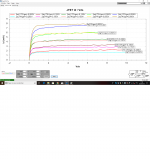I received samples of the Jfets from a customer who also used the DCA
Pro semiconductor tester and complained that they were not meeting
match spec of 1 mA.
Tested here, all 4 of the LSK170 / LSJ74 pairs were well within the 1 mA
match, and formed two matched quad sets also well within the spec.
It turns out that this is a limitation of the DCA Pro.
(It's right in the manual - I have one).
The voltage source is 12V at open circuit, but drops with Idss current so
that it's about 5 volts at 6 mA and with these 7 to 10 mA parts, goes
even lower, well out of the saturation region (Idss is saturated current).
While the DCA pro is a nice little tool, you don't use it to match higher
current Jfets, or any other high current / high voltage tests.

Pro semiconductor tester and complained that they were not meeting
match spec of 1 mA.
Tested here, all 4 of the LSK170 / LSJ74 pairs were well within the 1 mA
match, and formed two matched quad sets also well within the spec.
It turns out that this is a limitation of the DCA Pro.
(It's right in the manual - I have one).
The voltage source is 12V at open circuit, but drops with Idss current so
that it's about 5 volts at 6 mA and with these 7 to 10 mA parts, goes
even lower, well out of the saturation region (Idss is saturated current).
While the DCA pro is a nice little tool, you don't use it to match higher
current Jfets, or any other high current / high voltage tests.

I received samples of the Jfets from a customer who also used the DCA
Pro semiconductor tester and complained that they were not meeting
match spec of 1 mA.
Tested here, all 4 of the LSK170 / LSJ74 pairs were well within the 1 mA
match, and formed two matched quad sets also well within the spec.
It turns out that this is a limitation of the DCA Pro.
(It's right in the manual - I have one).
The voltage source is 12V at open circuit, but drops with Idss current so
that it's about 5 volts at 6 mA and with these 7 to 10 mA parts, goes
even lower, well out of the saturation region (Idss is saturated current).
While the DCA pro is a nice little tool, you don't use it to match higher
current Jfets, or any other high current / high voltage tests.

Ok Nelson but why does it look good enough on punkydawgs pair?
Attachments
Simple, because that matching was tighter.Ok Nelson but why does it look good enough on punkydawgs pair?
Interesting point.
First, the LS parts are not literally identical to the Toshibas.
I ran matching comparisons N and P channel parts from LS versus
the Toshiba parts I got slightly different results.
The parts were 8.0 mA Idss at 12V, and two samples each of the four
types were examined for Idss for Vds from 3 to 12 volts.
For the Toshibas the Idss wanders about 0.5 mA over that voltage range,
and the match between the two wanders about 0.2 mA.
The LS parts wander between 0.5 to 2 mA Idss from 3 to 12V Vds and
the matching changes by slightly more than 1 mA.
The voltage of the test clearly influences the matching, and we see
that for more money you can get better matching with the Toshibas.
For what we are doing here, the LS parts work fine.
If you want the Toshibas anyway, Punkydawgs is a reliable source.

First, the LS parts are not literally identical to the Toshibas.
I ran matching comparisons N and P channel parts from LS versus
the Toshiba parts I got slightly different results.
The parts were 8.0 mA Idss at 12V, and two samples each of the four
types were examined for Idss for Vds from 3 to 12 volts.
For the Toshibas the Idss wanders about 0.5 mA over that voltage range,
and the match between the two wanders about 0.2 mA.
The LS parts wander between 0.5 to 2 mA Idss from 3 to 12V Vds and
the matching changes by slightly more than 1 mA.
The voltage of the test clearly influences the matching, and we see
that for more money you can get better matching with the Toshibas.
For what we are doing here, the LS parts work fine.
If you want the Toshibas anyway, Punkydawgs is a reliable source.

- Status
- This old topic is closed. If you want to reopen this topic, contact a moderator using the "Report Post" button.
